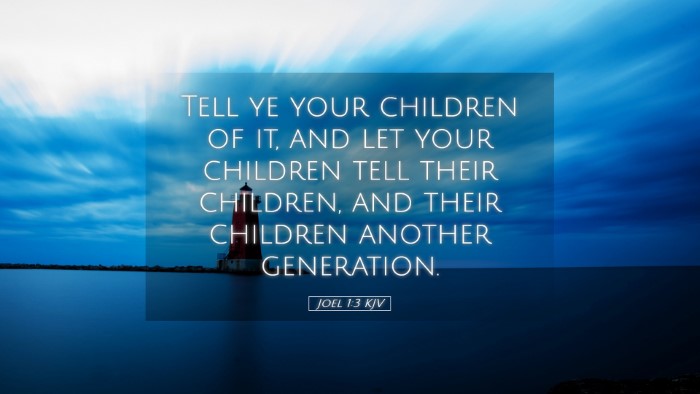Old Testament
Genesis Exodus Leviticus Numbers Deuteronomy Joshua Judges Ruth 1 Samuel 2 Samuel 1 Kings 2 Kings 1 Chronicles 2 Chronicles Ezra Nehemiah Esther Job Psalms Proverbs Ecclesiastes Song of Solomon Isaiah Jeremiah Lamentations Ezekiel Daniel Hosea Joel Amos Obadiah Jonah Micah Nahum Habakkuk Zephaniah Haggai Zechariah MalachiJoel 1:3
Joel 1:3 KJV
Tell ye your children of it, and let your children tell their children, and their children another generation.
Joel 1:3 Bible Commentary
Bible Commentary on Joel 1:3
Verse: "Tell ye your children of it, and let your children tell their children, and their children another generation."
Introduction
The book of Joel presents a compelling narrative that intertwines themes of disaster, divine judgment, repentance, and restoration. Joel 1:3 serves as a critical pivot in this text, emphasizing the importance of generational knowledge and the transmission of divine truths within families and communities.
Exegesis of Joel 1:3
Joel calls for a collective remembrance of a significant calamity that has affected the land, urging not only individuals but entire generations to understand and recount it. This emphasis reflects the need for collective memory in the life of the community.
In this verse, the phrase "tell your children" indicates a deliberate action to communicate the severity and implications of past events. The use of "another generation" signifies an ongoing narrative that should span across many ages, thereby embedding the lessons learned into the very fabric of societal consciousness.
Commentary Insights
-
Matthew Henry's Commentary
Henry notes that here lies a divine command for parents to be diligent in instructing their children. He stresses the importance of passing down not just historical accounts, but the spiritual lessons embedded within these events. By doing so, families can cultivate a sense of responsibility and awareness towards God’s dealings with humanity.
-
Albert Barnes' Notes
Barnes reflects on the societal implications of this verse, suggesting that a failure to pass down important truths can lead to a generation unaware of God's works and judgments. He emphasizes that the knowledge of God's works is essential for faith and for expecting His grace and intervention in times of trouble. Thus, this generational transmission serves both to educate and to warn future generations.
-
Adam Clarke's Commentary
Clarke emphasizes the symbolic significance of “children” in this verse. He interprets children not only as biological offspring but as future leaders and representatives of their generation. By conveying their history, particularly the divine acts, children can embody the lessons learned and perpetuate them into leadership roles within their communities.
Theological Reflections
The act of teaching the younger generation about God's past dealings serves multiple purposes:
- Preservation of Faith: It ensures that faith is not lost over time but is rather built upon through increased knowledge.
- Awareness of Sin: Understanding the cause of God’s judgment, as witnessed in the calamities mentioned in Joel, helps contextualize their spiritual need and the necessity of repentance.
- Encouragement of Hope: Alongside the warnings, recounting the deliverances and mercies of God encourages hope and reliance on divine help in future crises.
- Cultivation of Community Identity: Passing down stories strengthens the collective identity of the community, as shared narratives create bonds and affirm shared values.
Practical Applications for Ministry
Ministers and church leaders can draw several practical applications from Joel 1:3:
- Family Discipleship: Emphasizing the roles of parents in spiritual education by creating resources for family worship and generational teaching.
- Community Teachings: Organizing church events focused on storytelling where older generations recount God’s faithfulness, perhaps through testimonies of deliverance and judgment.
- Curriculum Development: Developing educational programs for children and youth that systematically review biblical history, focusing on the actions of God in their lives.
- Encouragement of Testimonies: Encouraging members to share personal testimonies about God’s intervention in their lives as a means of fostering hope and faith across generations.
Conclusion
Joel 1:3 invites an engaged and intentional approach to remembering and transmitting the experiences of God's work. The commentaries of Henry, Barnes, and Clarke highlight the multifaceted significance of this encouragement, addressing individual, familial, and communal aspects of faith. In passing down these stories, the church can foster a robust faith that thrives across generations, anchored firmly in the awareness of God's past judgments and mercies.


